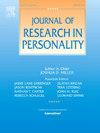Family experiences while growing up, personality traits, and well-being: A mediation analysis
IF 3.1
2区 心理学
Q2 PSYCHOLOGY, SOCIAL
引用次数: 0
Abstract
This study examines how early-life family experiences are associated with adult well-being (subjective, eudaimonic social, and eudaimonic personal well-being) and the role of personality traits in this process. Using data from 202,898 respondents across 22 countries in the Global Flourishing Study (representative samples, cross-sectional data), we find that positive family experiences predict higher well-being and foster traits such as extraversion, agreeableness, conscientiousness, and emotional stability, but not openness. These four traits positively predict all well-being types, while openness is linked only to personal well-being and shows no association with subjective well-being and a weak negative link to social well-being. Our results show that personality traits (excluding openness) partially explain how early-life family experiences are associated with adult well-being. Additionally, growing up with married parents is linked to higher social well-being, a relationship fully mediated by personality traits except for extraversion. These findings underscore the possibly lasting impact of early-life family environments on well-being in adulthood, with personality traits acting as key mechanisms. While supportive family backgrounds contribute to well-being through personality development, fostering these traits in individuals from less favorable backgrounds may promote well-being and personal growth. Understanding these associations can inform policies and interventions that help individuals flourish.
成长过程中的家庭经历、人格特质和幸福感:一个中介分析
本研究探讨了早期家庭经历与成人幸福感(主观幸福感、社会幸福感和个人幸福感)的关系,以及人格特质在这一过程中的作用。利用全球繁荣研究中来自22个国家的202,898名受访者的数据(代表性样本,横断面数据),我们发现积极的家庭经历预示着更高的幸福感,并培养外向性、宜人性、尽责性和情绪稳定性等特征,但不是开放性。这四个特征对所有幸福类型都有积极的预测作用,而开放性只与个人幸福有关,与主观幸福无关,与社会幸福有微弱的负相关。我们的研究结果表明,性格特征(不包括开放性)部分解释了早期家庭经历与成年幸福感的关系。此外,与已婚父母一起长大与更高的社会幸福感有关,这种关系完全由性格特征介导,除了外向性。这些发现强调了早期家庭环境对成年后幸福感可能产生的持久影响,其中人格特征是关键机制。虽然支持性的家庭背景通过个性发展有助于幸福,但培养来自不太有利背景的个体的这些特征可能会促进幸福和个人成长。了解这些联系可以为帮助个人繁荣的政策和干预提供信息。
本文章由计算机程序翻译,如有差异,请以英文原文为准。
求助全文
约1分钟内获得全文
求助全文
来源期刊

Journal of Research in Personality
PSYCHOLOGY, SOCIAL-
CiteScore
5.40
自引率
6.10%
发文量
102
审稿时长
67 days
期刊介绍:
Emphasizing experimental and descriptive research, the Journal of Research in Personality presents articles that examine important issues in the field of personality and in related fields basic to the understanding of personality. The subject matter includes treatments of genetic, physiological, motivational, learning, perceptual, cognitive, and social processes of both normal and abnormal kinds in human and animal subjects. Features: • Papers that present integrated sets of studies that address significant theoretical issues relating to personality. • Theoretical papers and critical reviews of current experimental and methodological interest. • Single, well-designed studies of an innovative nature. • Brief reports, including replication or null result studies of previously reported findings, or a well-designed studies addressing questions of limited scope.
 求助内容:
求助内容: 应助结果提醒方式:
应助结果提醒方式:


